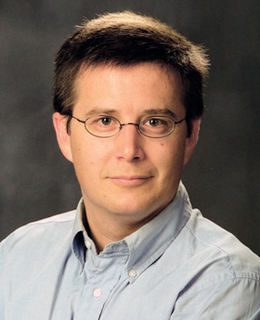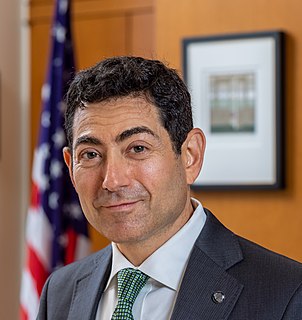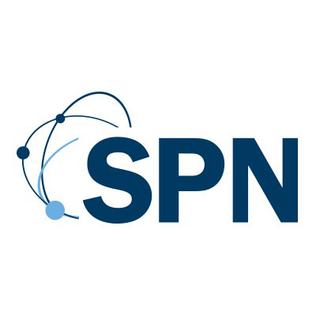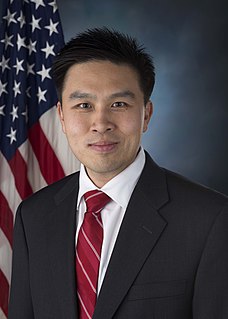Related Research Articles
The Hoover Institution on War, Revolution, and Peace is a conservative American public policy institution and research institution that promotes personal and economic liberty, free enterprise, and limited government. Located in Stanford, California, on the campus of Stanford University, it began as a library founded in 1919 by Stanford alumnus Herbert Hoover, before he became President of the United States. The library, known as the Hoover Institution Library and Archives, houses multiple archives related to Hoover, World War I, World War II, and other world-historical events.

Theda Skocpol is an American sociologist and political scientist, who is currently the Victor S. Thomas Professor of Government and Sociology at Harvard University. She is a highly influential figure in both sociology and political science. She is best known as an advocate of the historical-institutional and comparative approaches, as well as her "state autonomy theory". She has written widely for both popular and academic audiences. She has been President of the American Political Science Association and the Social Science History Association.

Peter Douglas Feaver is American professor of political science and public policy at Duke University. He is a scholar in civil-military relations. Feaver has served as the director of the Triangle Institute for Security Studies since 1999, and founded the Duke Program in American Grand Strategy. In 2007 he returned from service in the Bush administration, where he served as a special advisor for strategic planning and institutional reform on the National Security Council. Prior to working on the National Security Council of George W. Bush, Feaver served as director for defense policy and arms control at the National Security Council during the Clinton administration. He was also a lieutenant commander in the U.S. Naval Reserve.

Robert Owen Keohane is an American academic working within the fields of International Relations and International Political Economy. Following the publication of his influential book After Hegemony (1984), he has become widely associated with the theory of neoliberal institutionalism, as well as transnational relations and world politics in international relations in the 1970s.
Andrew J. Hoffman is a scholar of environmental issues and sustainable enterprise. He is the Holcim (US) Professor of Sustainable Enterprise at the University of Michigan's Ross School of Business and School for Environment and Sustainability (SEAS). His research uses a sociological perspective to understand the cultural and institutional aspects of environmental issues for organizations. In particular, he focuses on the processes by which environmental issues both emerge and evolve as social, political and managerial issues. He has written extensively about: the evolving nature of field level pressures related to environmental issues; the corporate responses that have emerged as a result of those pressures, particularly around the issue of climate change; the interconnected networks among non-governmental organizations and corporations and how those networks influence change processes within cultural and institutional systems; the social and psychological barriers to these change processes; and the underlying cultural values that are engaged when these barriers are overcome. His Ph.D. was conferred by the Massachusetts Institute of Technology in 1995. He is an expert in environmental pollution and has published eighteen books and over one-hundred articles and book chapters.

HASTAC (/ˈhāˌstak/') also known as the Humanities, Arts, Science and Technology Alliance and Collaboratory, is a virtual organization and platform of more than 18,000 individuals and 400+ affiliate-institutions dedicated to innovative new modes of learning and research. HASTAC network members contribute to the community by sharing work and ideas with others via the open-access website, by hosting HASTAC conferences and workshops online or in their region, by initiating conversations, or by working collaboratively with others in the HASTAC network.

The Association of American Universities (AAU) is an organization of American research universities devoted to maintaining a strong system of academic research and education. Founded in 1900, it consists of 64 universities in the United States and two universities in Canada. AAU membership is by invitation only and requires an affirmative vote of three-quarters of current members.
Scholars at Risk (SAR) is a U.S.-based international network of academic institutions organized to support and defend the principles of academic freedom and to defend the human rights of scholars around the world. Network membership includes over 530 higher education institutions in 42 countries.
Kriengsak Chareonwongsak is a Thai scholar and politician. He established the first future studies research institute in Southeast Asia, and was a Member of Thailand's House of Representatives, was on the executive Board for the Democrat Party, and has published on both scholarly and popular topics.
The Pepperdine University School of Public Policy (SPP) is a Master of Public Policy (MPP) degree program, located in Malibu, California with summer classes offered in Washington, DC. It is one of four graduate schools at Pepperdine University. The MPP is customized with specializations in Applied Economic Policy, American Policy and Politics, International Relations and National Security, State and Local Policy, and Public Policy Dispute Resolution.

Frank T. Rothaermel is a professor in the Scheller College of Business at the Georgia Institute of Technology and an Alfred P. Sloan Industry Studies Fellow. He holds the Russell and Nancy McDonough Chair of Business.

Mariano-Florentino "Tino" Cuéllar is a Justice of the Supreme Court of California, a scholar and academic leader, and a former official in the Clinton and Obama administrations. He is a scholar of administrative law and legislation, cyberlaw, international affairs and international law, public health and safety law, and institutions and organizations. He was previously the Stanley Morrison Professor of Law at Stanford Law School and the Director of Stanford's Freeman Spogli Institute for International Studies, and served as Co-Chair of the U.S. Department of Education's Equity and Excellence Commission. He was elected to the President and Fellows of Harvard College in February 2019. On November 1 he will become the tenth president of the Carnegie Endowment for International Peace.
Sergei Kukharenko, a Ph D in Philosophy, is a political scientist, an expert on Russian and Chinese politics, the Head of the Institute for Public Diplomacy in Asia Pacific, a member of Gorchakov foundation club of Russian foreign policy experts, a former leader of Amur Oblast regional department of the Right Cause right-wing liberal political party, and Republican Party of Russia - People's Freedom Party.

The State Policy Network (SPN) is a nonprofit organization that serves as a network for conservative and libertarian think tanks focusing on state-level policy in the United States. The network serves as a public policy clearinghouse and advises its member think tanks on fundraising, running a nonprofit, and communicating ideas. Founded in 1992, it is headquartered in Arlington, Virginia, with member groups located in all fifty states.

Lanhee Joseph Chen is an American policy advisor, attorney, academic, and political commentator. Chen serves as the David and Diane Steffy Fellow in American Public Policy Studies at the Hoover Institution, director of domestic policy studies and lecturer in the public policy program at Stanford University, and lecturer in law at Stanford Law School. He is also senior counselor at the Brunswick Group, an international business advisory firm.

Kiron Kanina Skinner is a former Director of Policy Planning at the United States Department of State in the Trump administration. Prior to that, she was the Taube Professor of International Relations and Politics at Carnegie Mellon University, and the founding director of the Institute for Politics and Strategy and associated centers at the university. She is also the W. Glenn Campbell Research Fellow at the Hoover Institution. Since leaving the Department of State, she has returned to her position at Carnegie Mellon University.
Maya Morsy is an Egyptian political scientist and specialist in public policy and an advocate for Women and Human Rights. She is an elected President of Egypt's National Council for Women (NCW) on 1 February 2016 to Date as the third and the youngest President of the NCW since it was established in 2000. The National Women Machinery of Egypt an independent body by law and constitution reporting to the President of Egypt, since February 2016. Before she was elected to lead the NCW, Morsy served as regional gender team leader for the Regional bureau of United Nations Development Programme in New York and Regional Center in Amman before she served as the Country Manager for the United Nations Development Fund for Women. She has been described as "one of the best public policy experts on social gender in Egypt, and perhaps even in all of the Arab world".
The main managing agency responsible for science and technology (S&T) in Vietnam is the Ministry of Science and Technology (MOST). MOST's responsibilities include scientific research, technology development and innovation activities; development of science and technology potentials; intellectual property; standards, metrology and quality control; atomic energy, radiation and nuclear safety; and state management on public services in fields under the Ministry’s management as stipulated by law.
Todd Rogers is an American behavioral scientist and Professor of Public Policy at the Harvard Kennedy School. He is the co-founder of the Analyst Institute and EveryDay Labs. At Harvard University, he is faculty director of the Behavioral Insights Group and the director of the Student Social Support R&D Lab. He is also an Academic Advisor at the UK's Behavioral Insights Team and a Senior Researcher at ideas42.
References
- ↑ Zuckerman, Michael (August 15, 2014). "Citizen Scholars". Harvard Magazine. Retrieved June 30, 2020.
- ↑ Strauss, Valerie. "A new 'Education Declaration' for genuine school reform". Washington Post. Retrieved June 30, 2020.
- 1 2 Siddiqui, Sabrina (August 7, 2012). "Paul Ryan Budget Plan Targeted By Progressive Academics". HuffPost.
- ↑ "The Politics of Climate Change Legislation". Harvard Magazine. February 15, 2013.
- ↑ McMurtrie, Beth (August 30, 2013). "Social Scientists Seek New Ways to Influence Public Policy". The Chronicle of Higher Education. Retrieved November 17, 2013.
- ↑ Voeten, Erik (June 6, 2012). "Scholars Strategy Network". themonkeycage.org.
- ↑ Tomasky, Michael (September 24, 2013). "How Legislators View Their Constituents". The Daily Beast. Retrieved November 17, 2013.
- ↑ Stanford Insights Staff (Fall 2012). "Stanford Professors Join Scholars Strategy Network to Engage with Public" (PDF). Stanford Insights. Retrieved December 4, 2013.
- ↑ Shan, Tony (March 20, 2013). "Experts explore who controls government". The Duke Chronicle. Retrieved November 17, 2013.